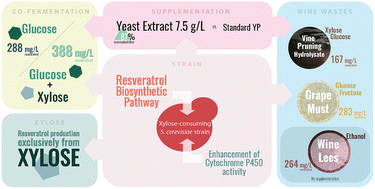Valorisation of wine wastes by de novo biosynthesis of resveratrol using a recombinant xylose-consuming industrial Saccharomyces cerevisiae strain†
Abstract
Resveratrol is a stilbenoid with strong antioxidant activity and several beneficial properties for human health. Plant extraction of resveratrol from natural sources is expensive and non-sustainable, owing to the low quantity of biomass and generally restricted availability. Biotechnological production of resveratrol can overcome these drawbacks. Here, the heterologous resveratrol biosynthetic pathway (via phenylalanine) was expressed in a xylose-consuming Saccharomyces cerevisiae strain. We further elucidated the roles of the pentose phosphate pathway and nutritional supplementation in resveratrol titres. By simultaneous fermentation of glucose and xylose, a 1.31-fold increase in resveratrol titre was observed when compared with glucose-only cultivation at the same carbon molarity, achieving a titre of 388 mg L−1. The recombinant strain was able to consume all sugars present in wine wastes, including non-naturally metabolised sugars like xylose. This allowed the valorisation of different vineyard residues, such as wine lees, grape must and hemicellulosic hydrolysate from vine pruning, achieving titres between 167.1 and 282.7 mg L−1 of resveratrol. The potential of environmental-friendly biotechnological processes over conventional processes like plant extraction using hazardous and polluting solvents is emphasised. This is the first report on the use of renewable carbon sources for resveratrol production from xylose and the use of winery by-products as a substrate to produce this stilbenoid. The expanded multi-sugar utilisation capacity of this yeast is valuable in a biorefinery context and obtaining high-value products such as resveratrol is critical to increasing process feasibility following a circular economy concept.

- This article is part of the themed collection: 2022 Green Chemistry Hot Articles


 Please wait while we load your content...
Please wait while we load your content...